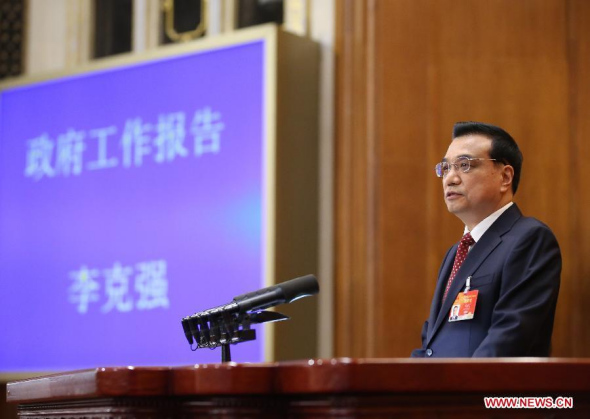

Chinese Premier Li Keqiang delivers the government work report during the opening meeting of the third session of China's 12th National People's Congress (NPC) at the Great Hall of the People in Beijing, capital of China, March 5, 2015. (Xinhua/Lan Hongguang)
China on Thursday announced a 10.1-percent rise in its national defense budget in 2015, the lowest growth in five years as the country confronts mounting pressure in the face of an economic slowdown.[Special coverage]
According to a budget report released shortly before the country's top legislature starts its annual session, the government plans to raise defense budget to 886.9 billion yuan (about 144.2 billion U.S. dollars).
That would make China the second largest military spender in the world following the U.S., whose defense budget amounted to 600.4 billion U.S. dollars in 2013.
Nonetheless, the 10.1-percent rise represented the lowest expansion in China since 2010, when the defense budget was set to grow by 7.5 percent.
The figure has thereon been riding on a multi-year run of double-digit increases, expanding 12.2 percent last year.
Thursday's budget report did not explain the rationale behind this year's abated growth, but a government work report presented by Chinese Premier Li Keqiang may offer some clues.
According to Li, China's national defense development would be coordinated with the country's economic growth.
The Chinese economy grew 7.4 percent in 2014, registering the weakest annual expansion in more than two decades. The government set this year's growth target to approximately 7 percent, brewing new concerns that the world's economic powerhouse is losing steam.
But Li played down such concerns, stressing that China is now in a "new normal" state, where a balance ought to be stricken between growth and structural optimization.
He said China will comprehensively strengthen modern logistics, step up national defense research and development of new- and high-technology weapons and equipment, and develop defense-related science and technology industries.
"Building a solid national defense and strong armed forces is fundamental to safeguarding China's sovereignty, security, and developmental interests," the premier said.
"Governments at all levels must always take an active interest in and support the strengthening of our national defence and armed forces," he said.
His words were mirrored by Fu Ying, spokesperson for the NPC session.
Speaking to reporters at a press conference on Wednesday, Fu said as a big country, China needs an army that can safeguard its national security and people.
"Lagging behind leaves one vulnerable to attacks. That is a lesson we have learned from history," said the diplomat-turned spokeswoman.
More than 35 million Chinese soldiers and civilians were killed or wounded as a result of Japanese aggression during the World War II.
China's military spending has long been at the center of Western scrutiny, drawing ire almost every year. Defense budgets grew 12.7 percent in 2011, 11.2 percent in 2012, and 10.7 percent in 2013.
But some experts believe the expenditure is still far from the level it needs to be in the face of increasingly severe security challenges.
Describing the 2015 defense budget increase as "moderate and reasonable," Chen Zhou, a researcher with the Academy of Military Sciences, said the rise was in line with China's national defense needs and its commitment to peaceful development.
"The army is in the key phase of informationization and mechanization as well as deepening reforms. A moderate, sustained increase in the military budget is thus necessary," he said.
Although the rise in the defense budget in the past years has surpassed GDP growth, China's military expenditure in 2014 accounted for less than 1.5 percent of GDP, well below the world's average of 2.6 percent.
Per capita military spending is even less, representing only about 4.5 percent of the United States, 11 percent of Britain and 20 percent of Japan.
Expenditures also soared as China's military forces are starting to bear more responsibilities around the world.
The country's military has joined international peacekeeping missions, fought piracy in dangerous waters, offered medical expertise in countries affected by Ebola and swept for mines in countries that are still recovering from past wars, all of which need more financial and material support, Chen said.
Chen said this year's military spending will be used for military training, updating weapons and equipment and improving soldiers' living conditions.
"We will make sure that every cent of the money is spent to boost the army's combativeness," said Chen. "This will be the 'new normal' in China's army development."
China to lower the annual GDP growth target to 7%
2015-03-05China raises budget deficit-to-GDP to 2.3 pct
2015-03-05Active release of military ‘tigers‘ makes PLA more trustworthy
2015-03-04Military parade to highlight peace commitment
2015-03-04Military launches blitz against corruption
2015-03-03Copyright ©1999-2018
Chinanews.com. All rights reserved.
Reproduction in whole or in part without permission is prohibited.